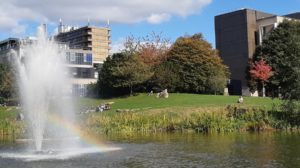Author: Fiona Gleed -

At the end of 2018, the Department of Architecture and Civil Engineering submitted a Silver application for Athena SWAN. But what is Athena SWAN? Why a Silver award? And what does it mean for us as students?
Athena SWAN was set up in 2005 to improve support for women working in Universities and research institutions that focused on Science, Technology, Engineering and Mathematics (STEM). It has since broadened its scope to become a gender equality charter across a wider range of disciplines. A parallel scheme provides a race equality charter. Both charters recognise the intersection of these and other aspects of identity, and hence the need to consider diversity across multiple dimensions.

The University of Bath became a member of the Charter in 2007 and achieved the Bronze Award in 2009. Ten years on, the University has achieved a key target of 20% female professors and is reiterating its commitment to diversity across all disciplines. There have since been numerous Departmental Bronze Awards and the first Silver Award was achieved by Pharmacy and Pharmacology in 2017. Architecture and Civil Engineering (ACE) currently holds a Bronze Award, recognising its commitment to promoting gender equality and address specific challenges identified for the Department.
The 2015 application required proactive enquiry into aspects of equality, followed by reflection on the findings and development of an action plan. This process raised the profile of diversity as an issue and highlighted potential improvements that could be implemented over the next few years. Implementation and monitoring of this action plan over the last few years has now allowed the Department to apply for a Silver Award. Continuing students may recall being invited to respond to the ACE Culture survey last summer and data on aspects of our studies such as admissions, progression rates and classification have also been taken into account.

The application was developed by the Departmental Self Assessment Team (DSAT) chaired by Dr Marion Harney. I have been acting as the post-graduate representative on the committee and it has provided an amazing insight into how the Department works and the drive to make sure that our time here as students really works for all of us. Nowhere is perfect but the discussions were wide ranging around priorities for improvement and how these could be achieved. The action plan includes numerous improvements for Academic, Professional and Technical staff. These will benefit us as students too as there should be a diverse range of staff to inspire and support us, from more varied perspectives. And with an emphasis on a healthy work-life balance, our lecturers should get the time and support they need to fully develop inspiring teaching materials and provide effective feedback on our work.
Specific actions for us as students include representation on the Department’s Equality, Diversity and Inclusivity Committee (EDIC), which will replace DSAT. Undergraduate (UG) and taught post-graduate (PGT) representatives will be recruited as well as a post-graduate researcher (PGR) as I am nearing the end of my studies. There is also a promise of more support for WES Bath, our student cluster of the Womens Engineering Society who run regular events such as the networking evening to be held on campus on Tuesday 19th February. So do sign up for the networking, look out for the rep roles and keep your fingers crossed for Silver!
Respond

